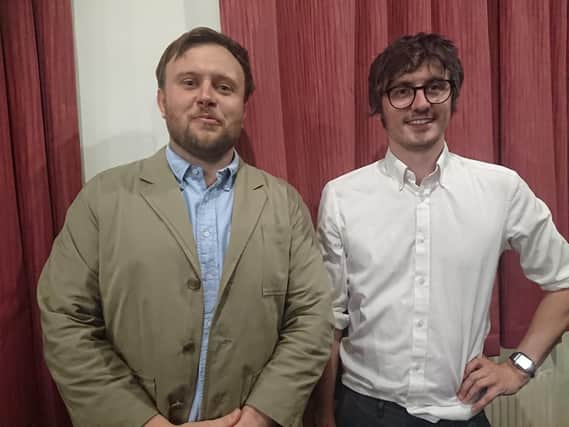Innermost thoughts of famed Horsham poet Shelley revealed in private letters


The Friends of Horsham Museum and Art Gallery hosted two academics on July 12 at the Wesley Hall, whose expert analysis of the thoughts and ideas of the world-renowned poet brought him vividly and poignantly to life.
Dr Will Bowers of Queen Mary, University of London, and Dr Andrew Hodgson of the University of Birmingham, shared their insight into the close intellectual bond between Shelley and a number of close friends.
Advertisement
Hide AdAdvertisement
Hide AdMost of the letters they chose for this audience and put on the screen revealed Shelley’s close friendship with a woman artist and teacher, Elizabeth Hitchener, ten years older than him, who lived in Hurstpierpoint.
Will and Andrew passed round a sheet of A4 paper with a seal on one side, carefully folded, with Shelley’s notes in each section. They said he always wrote on just one sheet of paper, the cheapest way of sending a letter.
One letter described Percy and Elizabeth’s first meeting at the old school house in Cuckfield, now the village’s museum, where she was the teacher. They exchanged many letters in which she suggested a different point of view to temper some of his passionately held views. He talked about the nature of human love, but was keen that Elizabeth should not get the wrong end of the stick and imagine that he was in love with her.
Their letters reveal much about the life and works of the tall, fine featured, dark haired young woman, whose silhouette – a more affordable type of portrait – was shown on the screen and the younger man to whom she was writing.
Advertisement
Hide AdAdvertisement
Hide AdWill and Andrew are travelling the world to research the 741 letters that Shelley wrote in his brief life, before his tragic death in a boating accident in Italy in July 1822 at the age of just 29.
They are editing a new book of Shelley’s letters and are visiting the museums and private collections where they are presently held, mainly in the United States. They said that many impoverished Victorians sold Shelley’s letters then in their possession abroad, mostly to the United States.
There is so much research to be done that the book will not be published until 2035. The editors want to shine the light of Shelley’s fame onto the people he was writing to and are researching these people’s lives so that they in turn will shine their light on Shelley.
Their book follows ‘The Letters of Percy Bysshe Shelley’ edited by Frederick L Jones and published in 1964.
Advertisement
Hide AdAdvertisement
Hide AdWill revealed Shelley’s meditations on home in Horsham and the pain the young poet felt over the rift with his family whom he missed greatly when in exile in Italy. The themes of his poetry – history, protest and landscape – are echoed in the letters.
Shelley admits he was often torn between what he knew he should do – and what he wanted to do. He felt that reason cannot account for the truth of feeling and that our hearts are better at accessing truth than our minds. The letters also contained his meditations on friendship – which Shelley valued greatly.
Many members of the Friends of Horsham Museum & Art Gallery attended the talk. The Chair, Paul French said: “This was a wonderful evening for the Friends and their guests and our two celebrated speakers were both informative and entertaining. They were most impressed by the knowledge of the audience and the clear local connection with the legacy of Shelley.”
The Museum holds the largest collection of Shelley’s letters and it is well worth a visit to see them on display in a room which is dedicated to his life. His work speaks powerfully to the younger generation.
Advertisement
Hide AdAdvertisement
Hide AdMost poignantly the speakers said that Shelley had a great sense of wonder at the mystery and complexity of human life, which made it all the more tragic that his own was so short. Elizabeth also died in 1822.
The audience included members of Horsham’s Shelley Memorial Project, which has recently received applications from artists hoping to win the commission for the Shelley Memorial designated for installation in Horsham Park.
They staged the Shelley 200 Festival last year and in the autumn Radio Four’s Roger McGough will take part in the final of their second poetry competition, for which applications are now welcome.